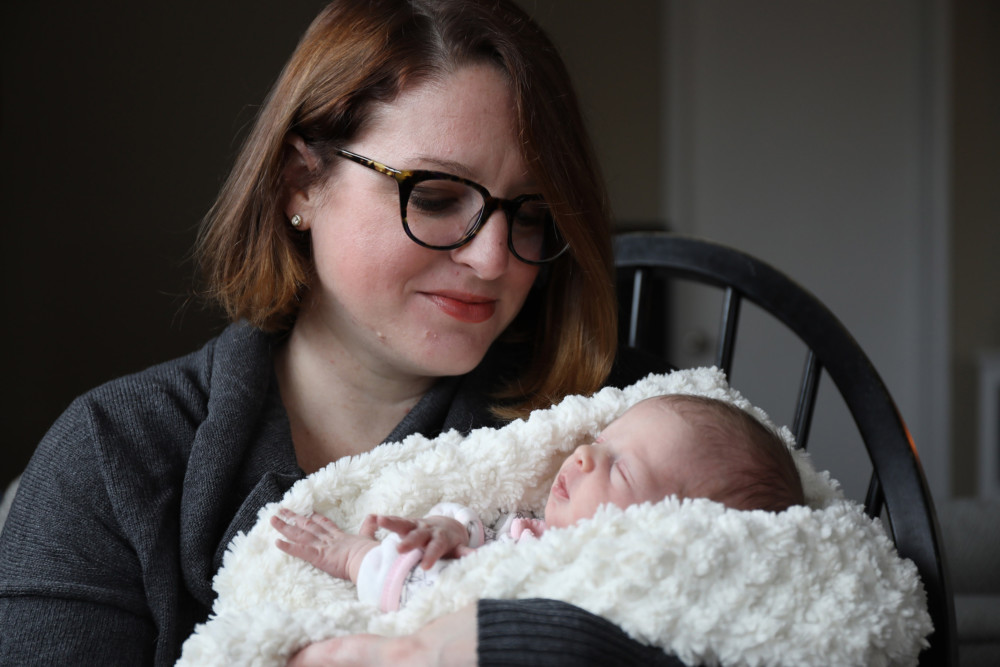By Alison Bowen
Chicago Tribune
WWR Article Summary (tl;dr) Many things lead to a C-section, and each experience is different. Those who counsel postpartum women say that for many, the memory lingers.
CHICAGO
Emily Keber-Goldrick remembers the moment she was told she needed a C-section.
The Bucktown mom initially hoped for a water birth, with a plan detailed down to lavender oil. But while pregnant with her son Rowan in 2014, she developed pre-eclampsia, a life-threatening pregnancy complication. Doctors monitored her closely, she said, and after 28 hours of labor and with her son’s heart rate dropping, a C-section was advised.
“I just burst into tears,” said Keber-Goldrick, 32. She felt, she said, she had failed.
Not every woman feels troubled by her birth experience. But having a C-section, one in three births nationally, is one reason women seek mental health help following a delivery, say Chicago mental health professionals.
Mental health struggles after a C-section range from guilt and anxiety to trauma from feeling their life, or the life of their baby, was in danger.
“The emergency nature of C-sections leads them to feel out of control, as well as fear that there will be harm to the baby or themselves,” said Dr. Sarah Allen, a Chicago psychologist and director of the Postpartum Depression Alliance of Illinois, which runs self-care workshops for women.
Many things lead to a C-section, and each experience is different. Those who counsel postpartum women say that for many, the memory lingers.
“They couldn’t have that rite of passage that birth is supposed to be,” Allen said. “Women start ruminating or questioning themselves, ‘What did I do wrong? What could I have done to prevent this?'”
Allen has counseled postpartum women for two decades and said many report anxiety or depression, at least in part, because of their C-section. And she notes a difference between postpartum depression and a woman experiencing trauma rooted in a C-section alone.
“It’s specifically around the birth experience,” she said.
Women who previously have experienced anxiety or depression are most at risk for maternal mental health issues, said Dr. Katherine Wisner, who directs the Asher Center for the Study and Treatment of Depressive Disorders at Northwestern Medicine Feinberg School of Medicine.
About 1 in 7 new moms experience postpartum depression, and although symptoms can appear any time during the first year, they typically manifest within three months, according to the Asher Center. Markers include anger, irritability, crying, guilt, shame, sadness and lack of interest in the baby.
And about 70 to 80 percent of new mothers experience mild symptoms within two to four days, like crying or trouble sleeping and eating, often known as the “baby blues,” according to the Asher Center.
Lauren Orchell, 35, didn’t fully realize how much her C-section affected her until her doctor suggested she schedule another.
She and her husband declined. During her first birth, in 2014, doctors had noticed high blood pressure at her 40-week appointment, she said, and induced her. Laboring for 10 hours ended with surgery.
Without much communicated about what was happening and why, Orchell said her husband felt helpless; she felt isolated. Right after her son was born, she asked to see him. No one heard her.
“We had no idea that both of us were so traumatized by the first experience,” she said.
Women hesitate to voice negative feelings surrounding birth, said Dr. Marcela Almeida, a psychiatrist at the University of Illinois Hospital & Health Sciences System, where she directs the Women’s Mental Health and Reproductive Psychiatry Service. They might feel shame or stigma around sharing anything but positive emotions surrounding new motherhood.
“It’s much more common than we hear,” she said. “It’s underreported.”
Almeida said her clients with post-traumatic stress disorder experience hypervigilance, intrusive thoughts and flashbacks, and they avoid places that trigger reminders of their C-section, like an appointment with the same doctor or at the same hospital. Some experience suicidal thoughts.
“And sometimes (symptoms) stay for a long time,” she said. “Sometimes we’re talking about months. We’re talking about years.”
Postpartum Support International, a Portland-based organization that aims to increase perinatal depression awareness, estimates 9 percent of women experience PTSD following childbirth, often because of a real or perceived trauma. This could include an unplanned C-section or the baby needing intensive care. It can also include a feeling of powerlessness or lack of support during delivery.
Almeida helps women find a support system and discuss their emotions. She tells clients, “There’s so much more in motherhood than those few hours when you have no control, when things go in an unexpected way.”
To help process her feelings, Keber-Goldrick interviewed other postpartum moms and photographed them for a project called “Memories of Joyful Birth.” The conversations were therapeutic, she said. Many also felt they’d failed.
“That’s your first duty as a mom,” Keber-Goldrick said on a recent afternoon in an apartment filled with baby books and toy trucks. “It’s one of the biggest days of your life, and it’s traumatic. It’s OK to want more.”
Keber-Goldrick spent the years between her pregnancies plotting how to avoid another surgery. She trained as a doula, helping other women through birth, and she learned about vaginal delivery options. With her second pregnancy, she switched practices for a fresh start. But high blood pressure again signaled pre-eclampsia, she said, and in December she again delivered through a C-section.
This time, however, she felt armed with information. And speaking with other moms about her post-birth emotions had eased previous feelings of failure and guilt.
“I did a lot of soul-searching following my son’s birth,” she said. “I think it’s important to remember, and I really had to come to peace with it, that cesarean birth is still birth. It’s still important, and it’s monumental, and it’s life changing.”














































































































































































































































































































































































